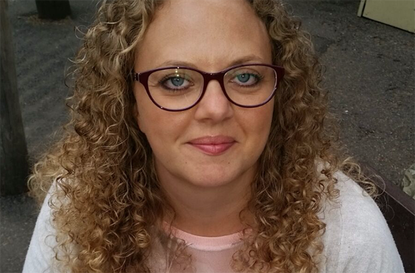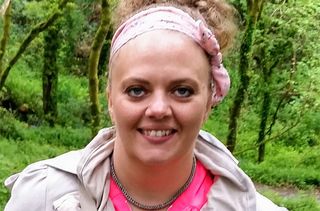'I would start to act as though I was giving birth again' Mum opens up about battling PTSD after her traumatic labour
Tracy bore the mental and emotional scars of her traumatic birthing experience for years


Most mums-to-be go through pregnancy feeling a little nervous about the birth, and it's totally normal to start feeling more preoccupied with it closer to your due date.
No matter how carefully you prepare for your birth, it doesn't always work out the way you expect - lots of mums have plans to give birth naturally, and then have to go in for emergency C-sections. Lots of women want to avoid pain relief, but complications mean that turns out not to be an option.
Whatever happens during childbirth, welcoming a healthy baby into the world is one experience that mums typically agree is worth the pain - but some go through more extreme experiences than others. For Tracy Jones, suffering with Post Traumatic Stress Disorder (PTSD) for years after the difficult birth of her daughter left her unsure about conceiving ever again.
Here, she shares her birth story, and explains how she's now managed to turn her ordeal into a positive.

It was in the 'early' stages of my labour that I overheard the doctor say: 'She's expecting something for nothing. There's nothing happening at the moment'.
It was as though I was making a big fuss over nothing, which left me feeling really panicked - it was my first child and so I didn't really know what to expect. I thought 'if this isn't labour, how am I going to cope when it is?'
My pregnancy had been okay - I'd been getting some irregular heart rhythms which I'd spoken to the midwife about. She looked into getting me some blood sugar tests, and that came back as positive for gestational diabetes. I'm not diabetic, and there's no family history of it either, so it came as a shock.
GoodtoKnow Newsletter
Parenting advice, hot topics, best buys and family finance tips delivered straight to your inbox.
Managing the condition was stressful - I had to check my blood sugars six times a day, before and after every meal. I was working at the time as well so trying to juggle the rest of my life at the same time was a big commitment. When I was diagnosed, the consultant told me how some women turn up for a routine check up and find the baby has 'drowned in sugar' inside the womb, and did – this was a constant image in my mind, and meant I was terrified of eating anything remotely sugary through the pregnancy.
On my due date, the nurses said I'd have to be induced because of the diabetes. During the afternoon I started to have some mild labour pains, but they were just brushed off by the midwife who said they were just niggles; it all just felt so dismissive. The early labour pains were becoming more and more intense, but even then I was told that my husband would have to leave in an hour when visiting times finished. I was really worried about that - obviously I didn't want things to start up without him.
There was one healthcare assistant who did seem to realise I was in a lot of pain, and told me to go and have a bath, which I did. I remember crying in the bathroom knowing that my husband was going to have to go soon - but as soon as I got in the bath, my waters broke. It was only then that they realised I wasn't making as big of a fuss as they originally thought I was.
It was a big rush then - out of the bath, getting me into a wheelchair and wheeling me down to delivery, bashing into all of the door frames on the way down, and then when I got there they realised that I was over 7cm dilated and things were happening really really quickly; it was too late for pain relief.
They'd worked out that the induction had actually caused an overstimulation effect on the uterus, so what was happening was, rather than having the strong contractions and then a break, there were no breaks in between at all. It was almost just one, long contraction. The baby by this point was in distress - obviously it was difficult for me, but for her as well. She wasn't getting any breaks in between either, so it was very intense for her. The paediatrician was called, and they were very concerned about her. At one stage, her heartbeat was dropping quite dramatically.
Thankfully, she was born and was okay, but about a month afterwards I realised that I didn't feel right. That was when I started feeling really anxious - I was getting flashbacks of the birth, and at times, my husband told me that I would actually start to act as though I was giving birth again. I was in a real heightened state of anxiety. It was something completely new for me, I'd never experienced anything like that before.
The doctors had originally diagnosed it as depression, but I think that I was depressed because of the anxiety and the trauma. Initially I was given antidepressants, but then I found the Birth Trauma Association whilst looking online, and everything that was on there was exactly as I was experiencing it at the time. I took the information along with me to one of my appointments and that's when they started to listen to me, and realise that there might be something more than depression going on.
At that point I felt so low, because I thought no one understands what's going on, and no one else has ever experienced this; it was only afterwards that I was referred to a different hospital and a different psychiatrist and she said straight away that it was PTSD. My daughter was about 10 months old at this stage, and I just hadn't realised that PTSD after birth could be 'a thing'. I really did feel so alone; people would say, 'People just said, just be thankful that you're okay and the baby is okay'. Of course I was, but having all this going on and having no explanation made it really difficult.
I didn't have any problems bonding with my baby - in fact I felt that she kept me together during the day. It was when she went to bed in the evenings that was when I'd really fall apart and struggle. But even during the day I had to have a lot of support from family - my husband would drop me off on his way to work at my mum's house, because I just felt like I couldn't stay on my own in the house. So I would spend the whole day there from 7am to 6pm, with my mum for support; my husband would pick me up on the way home, and we'd spend the evening at home; it was really a strange, challenging set up.
During this time I couldn't work, I couldn't even stay in the house on my own to look after my daughter. It had a really big impact on my own life and my husband and my daughter – I am so grateful that my husband was so understanding and supportive throughout, and I know it was very difficult for him too. I also feel lucky that I had such strong support from my parents and family as some people suffer this with no or little support.
Though I'm completely recovered now, I'd say my daughter was three-and-a-half before I started feeling like me again. I found a treatment called Eye Movement De-Sensitization reprogramming (EMDR), which helps you to process the trauma more effectively, and that really aided my recovery. What happens is, you go through the traumatic incident in your own mind and there's no need to verbalise anything, and in the meantime the therapist will encourage you to move your eyes in different directions. It encourages the whole of the mind, the whole of the brain to process the traumatic event and allow it to be filed away as it should be as a memory, so it's no longer affecting you on a daily basis.
I'd been undecided about whether to have any more children because of everything that had happened - I was very nervous and anxious, but eventually it got to four years and I just thought that maybe we could do... but I knew I had to do something different that time, I knew I couldn't do that again. I thought, if I could have a natural birth that was more positive, then maybe it would be even more psychologically healing for me, really.
Despite my fears, I went on to have a son five years later as well, and I did a hypnobirthing course which made a huge difference. It teaches you to where the pain in childbirth actually comes from, which is often fear, and teaches you how to deal with it really and relax through it, and deal with any anxiety leading up to birth as well.
I also went to a different hospital and was under a different team, because I just wanted things to be completely different.
I'm a hypnotherapist myself now, and because of my negative experience I feel like I'm more able to understand people who have anxiety, and lots of different issues. I support people via email, through the Birth Trauma Association, and I've encountered so many women over the last few years who have had similar kinds of experiences to myself. I want to do more work with the charity going forward, and I've mentioned to them about helping midwives to become more aware of the issue.
I think it's so important for them to understand that for women who are giving birth it's such an immensely vulnerable and important time, and just the wrong remark or just something dealt with insensitively can have such a huge impact.
Trusted, informative, and empathetic – GoodToKnow is the ultimate online destination for mums. Established in 2007, our 15-year-strong archive of content includes more than 18,000 articles, 1,500 how-to videos, and 7,000 recipes.
-
 Compromising may be killing your relationship - here are 5 ways to reach healthy compromises, according to relationship expert
Compromising may be killing your relationship - here are 5 ways to reach healthy compromises, according to relationship expertCompromising isn't always the best way to keep the peace in a relationship
By Charlie Elizabeth Culverhouse Published
-
 Best interactive pets for kids: 15 gift ideas for children of all ages
Best interactive pets for kids: 15 gift ideas for children of all agesFrom puppies to axolotls, take a look at our selection of the best interactive pets you can buy that are sure to be a hit with little animal lovers
By Sarah Handley Published